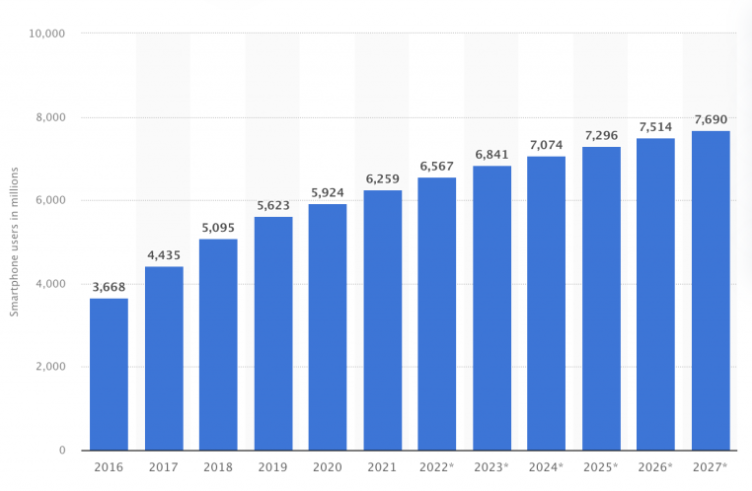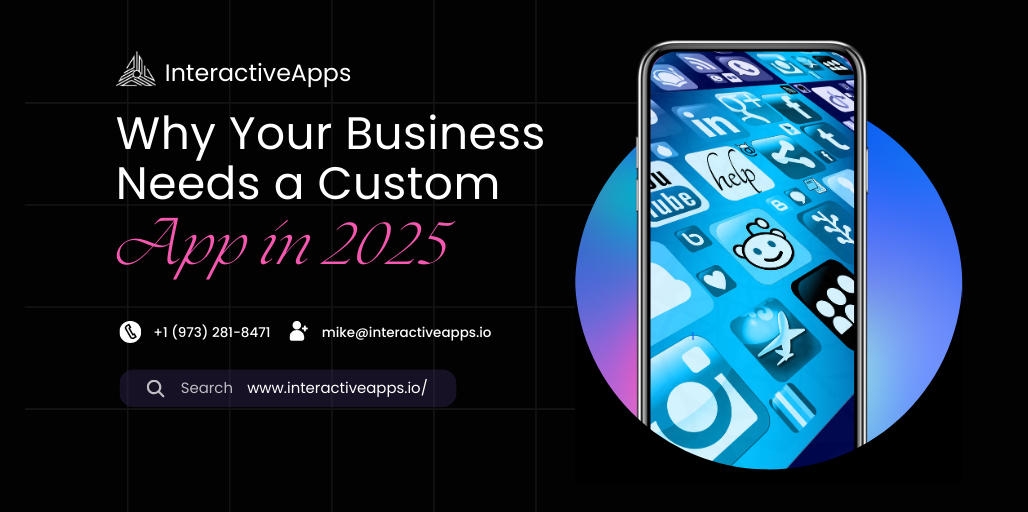In 2025, a mobile app is no longer just a nice-to-have. They have become a survival tool for businesses. Big names, small names, and the ones still finding their footing — all are racing to build deeper connections with people. According to BuildFire, in 2025, there are more than 6.3 billion smartphone users worldwide.

A custom app isn’t about jumping on a trend. It’s about keeping up with how people behave now. The way they shop, how they talk to brands, where they get help, and what they expect from a service — all of that has shifted. The smartphone sits at the center of this change.
People Live on Their Phones
According to Statista, the average smartphone user spends 4.8 hours a day on mobile apps. That’s a fifth of the day. Not on calls. Not browsing the web. But deep in apps — buying, watching, reading, and checking in.
Sensor Tower shows that mobile app spending worldwide hit $171 billion in 2023 and is expected to cross $200 billion by 2025. The fastest growth is happening in areas like e-commerce, healthcare, education, and home services.
If a business isn’t present on a phone, it’s missing the primary place where people now exist digitally.
Custom vs. Generic: One Size Never Fits All
Most businesses start with generic tools. Ready-made platforms. Drag-and-drop websites. Social pages. Those are great to test an idea. But as soon as things start moving, they show their limits.
A custom app does one thing above all else — it grows with the business. Every click, every swipe, and every tap can be shaped to match how the business runs and how customers behave. A public template can’t offer that level of freedom.
A Salesforce report from late 2024 found that 72% of consumers expect companies to understand their needs, not just push a product. That’s tough to do without a tool that listens, responds, and adapts — like a custom app.
Experience Isn’t Optional Anymore
The UXCam Mobile App Benchmark Report showed that 67% of users will leave an app forever if it crashes once or takes too long to load. In 2025, speed and simplicity are table stakes. People swipe away without guilt.
A custom-built app allows for a smooth experience from end to end. It cuts out the fluff. It creates space for delight — fast checkouts, clear support, tailored content, and smart alerts. People don’t compare apps by type anymore. They compare by experience. If a food delivery app feels better than a bank app, the bank app is the problem.
Control Over Data = Control Over Destiny
Every swipe and tap gives away something. Behavior. Preference. Frustration. Joy. When that data sits with third-party platforms, the business loses control. A custom app puts the data back where it belongs.
McKinsey’s 2024 Customer Personalization Study showed that companies that used data-driven personalization saw 40% more revenue growth than those that didn’t. The trick isn’t just having the data — it’s owning it, understanding it, and acting on it. That only happens when the app is built with intention.
Branding Without Noise
Generic platforms are noisy. Everyone looks the same. The fonts, the colors, the layout — they blur together. A custom app becomes a canvas. It carries the mood, the tone, and the emotion of the brand.
Imagine opening an app and knowing within two seconds who made it. That level of identity builds trust. It keeps people coming back. A Lucidpress study found consistent branding increases revenue by 23% on average. And branding doesn’t mean just a logo. It’s the flow. The feeling. The story the app tells without words.
Push Notifications Still Work (When Used Right)
People ignore emails. They scroll past ads. But push notifications, when done thoughtfully, still cut through the clutter. Not the annoying ones. Not the ones that come five times a day. But the ones that feel like a gentle tap on the shoulder at the right moment.
Airship’s Mobile App Experience Report in early 2025 showed that 61% of users opted into push notifications for apps they trusted. Custom apps allow smart triggers. Not bulk messages, but timely, personal nudges. A reminder for a restock. A notice of a discount. A thank-you after a review. These little touches drive big returns.
Custom Apps Can Cut Costs (In the Long Run)
Yes, a custom app costs more upfront. But over time, it can actually save money. With full control, businesses don’t need to pay subscription fees for multiple platforms. They can automate internal processes. They can reduce dependency on customer support by adding smarter flows.
A 2024 Deloitte Tech Cost Study showed that custom digital tools reduce long-term operational expenses by 18% on average compared to stacking third-party solutions. More than cost-saving, it’s about building something that pays back in control.
The Rise of Micro-Communities
Massive audiences don’t always translate to loyal ones. In 2025, businesses are realizing the value of focused, engaged communities. And apps are where these communities thrive.
A custom app can support exclusive content, events, direct feedback, user-generated uploads, and shared experiences. It creates a private digital space — far away from noisy feeds. People don’t just visit these apps. They live inside them.
Offline Capabilities Matter
Connectivity isn’t perfect. Travel, commutes, poor networks — they happen all the time. A custom app can be built to work offline in ways web platforms simply can’t. Notes can be saved. Orders can be queued. Resources can be accessed.
This becomes especially important for service businesses, field workers, and users in developing regions. It’s one of the least glamorous but most powerful reasons to go custom.
Security Gets Real
Data leaks, phishing, hacked credentials — all are still real threats. A report from IBM Security released in Q1 2025 noted that the average cost of a data breach in small- to mid-sized businesses is now $3.54 million. That’s not something most businesses can absorb.
A custom app can be built with security at the core — not bolted on after. End-to-end encryption. Two-factor authentication. Role-based access. Custom login methods. With full control, businesses aren’t relying on third-party security practices that can change without notice.
Integration With Existing Tools
Most businesses don’t run on one system. There’s inventory. Bookings. Payments. CRMs. ERPs. When an app is custom, it can talk to all of them. Smoothly. No broken links or messy patchwork.
Custom apps create ecosystems. That helps teams internally just as much as it helps customers externally. Everyone gets the same view. Everyone moves faster.
Better Feedback Loops
In a world where change happens fast, feedback becomes gold. A custom app allows real-time insight into what’s working and what’s not. Clicks, drop-offs, patterns — all that tells a story.
Amplitude’s 2025 Usage Analytics Guide found that teams using custom app dashboards release new features 43% faster than those using generic platforms. Quick feedback creates quick fixes. That builds trust.
Accessibility Isn’t Just Good Practice — It’s Law
In 2025, digital accessibility will not be optional. Governments around the world are pushing laws to ensure apps can be used by people with disabilities. A template won’t cut it.
A custom app can be built to meet WCAG 2.2 standards from day one — voice commands, readable text, color contrast, screen reader support. It’s ethical. It’s inclusive. And yes, it avoids lawsuits.
Real Examples Speak Loud
- Starbucks didn’t just make a coffee-ordering app. It made a loyalty engine that tracks preferences and rewards with every tap. Over 30% of its orders in the US now come through the app.
- Domino’s made it possible to order pizza from anywhere — even a smartwatch. It owns over 70% of its digital sales through its own platforms. No middlemen.
- Nike’s SNKRS app turned launches into events. Exclusive drops. Live storytelling. Fans camp out digitally — not on the street. Engagement went through the roof.
This isn’t limited to giants. Local salons, tutors, gyms, and food trucks are doing the same. Not at the same scale — but with the same intent. To own the experience. To keep people close.
A Custom App Is an Investment, Not an Expense
The business world in 2025 is fierce. Attention is short. Loyalty is earned. Expectations are high. A custom app doesn’t guarantee success, but not having one adds friction everywhere.
People want convenience, clarity, speed, and care. A custom app delivers all four.
Final Thoughts
If a business had to choose one digital move this year, building a custom app should be high on the list. Not because it’s flashy. But because it quietly solves dozens of problems that stall growth.
It brings people closer, makes teams faster, It builds trust, and more. It also pays back — in control, in data, in loyalty, and in long-term value.
Custom apps are not just for the tech-savvy anymore. They’re for anyone who wants to shape their own path in a noisy world.



